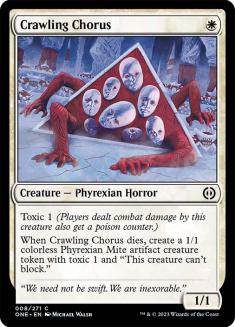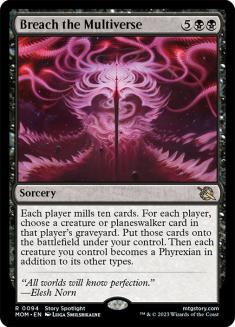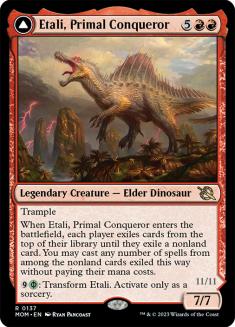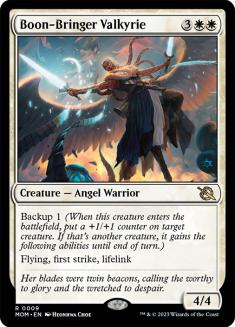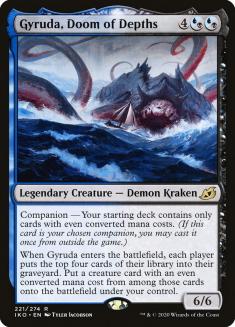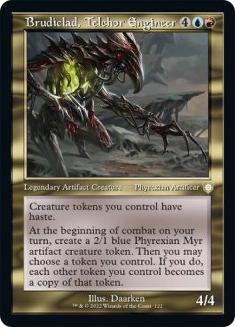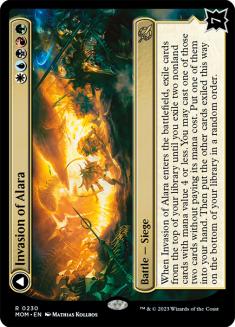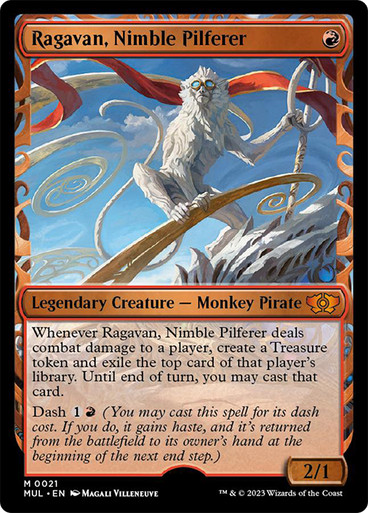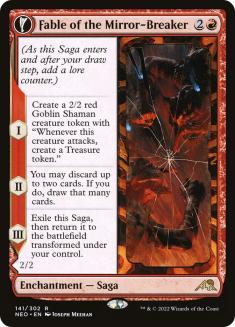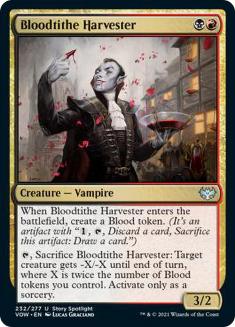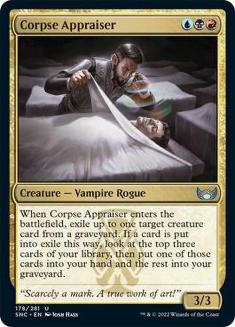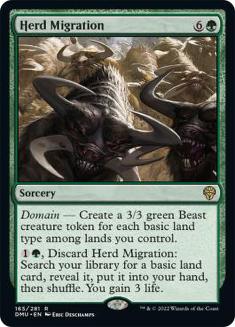Next week marks the highlight of any Magic grinder’s calendar – the return of the Pro Tour. For Magic at large, the stakes are lower than last time. Pro Tour Phyrexia was the return of the Pro Tour and the ultimate test of this new Organized Play system, and it was successful enough that Pro Tour March of the Machine gets to be just the next Pro Tour in the rotation.
For me, the stakes are high – after earning my invite at the New Capenna Championship a full year ago and deferring that invite from Pro Tour Phyrexia, I finally get to play! I qualified for the first and last online equivalents of the Pro Tour, and those events were fine for what they were by the end… but they weren’t the Pro Tour. As someone who tried for years to get to my first paper Pro Tour and then again to get back there, this is the opportunity I’ve waited for. It’s an unusual feeling to be this emotionally invested in a tournament, but that’s how you want it to be. I can only hope I have good news to report here next time!
Draft of the Machine
The festivities kick off with a rare taste of high-level Limited. The six Draft rounds always played second fiddle to the ten Constructed rounds in the recent structure of the Pro Tour, especially when the all-important Top 8 was always Constructed too, but they are an integral part of both the tournament and the broadcast. The Arena era was all Constructed, all the time. The return of the Pro Tour meant the return of Limited, and this is a challenge for the coverage as well as the competitors.
Even when Limited was a regular fixture of Pro Tour coverage, it felt like they never quite figured out how to present it. For Limited enthusiasts, this was the main chance (the only chance now that Grand Prix are no more) for them to watch their favourite form of Magic in a competitive setting, but they rarely received the level of detail they wanted. For others who had to sit through Limited with gritted teeth to get to the ‘real’ Magic, there wasn’t much there to placate them either.
The production itself took big steps forward at Pro Tour Phyrexia, but that only goes so far if the Magic itself isn’t compelling. Some called out Phyrexia: All Will Be One Draft as one of the worst Limited formats they had ever played. Others were less extreme, but it was hard to find anyone who was actively excited about the format, even if they were winning at it. If the players in the tournament and the loudest Limited voices aren’t singing a format’s praises, it’s hard to expect viewers at home to get excited about it.
March of the Machine Draft has its detractors, but also has some very valuable and vocal champions. The idea that all publicity is good publicity doesn’t apply here – you do actually need to generate some genuine excitement! For my part, I’ve found the format puzzling and challenging, but very engaging. When I was on an awful losing streak at the start of my testing, I still saw features in the format that kept me interested and putting the work in to turn that around.
The Viewing Experience
One question we don’t talk about enough for Constructed or Limited is how much crossover there is between what makes a format fun to play and what makes it fun to watch. The kind of bread-and-butter Limited Magic that gets approving nods from experienced drafters isn’t captivating for an audience with a short attention span and all of Twitch at their fingertips.
Experienced game designers have made the case for bombs being necessary and actively good for Limited, but as a commentator, I think they are also essential for making Limited presentable for a mass audience. Bombs create amazing comebacks, and beating some outrageous bomb can be a great story in its own right. If you want memorable moments that will get people talking, the pushed rares are much more likely to give you that than a well-timed combat trick letting a two-drop beat another two-drop.
It’s hard to beat March of the Machine in that regard. The sheer tonnage of bombs in this set offends many Limited mainstays and can make the individual losses feel swingy and frustrating, but it’s exactly what the broadcast needs to make the Limited rounds appointment viewing.
More broadly, what this set has in spades is variety. The higher power level across the board and the deep synergies in the set mean there are few cards doomed to languish in sideboards forever. The introduction of battles as an entirely new card type and the Multiverse Legends bonus sheet each add their own layer of complexity and variety. Companions were heinous for Constructed Magic, but they were a delightful subquest in Ikoria Limited, and I love that people get to chase that dream again.
To put it another way, this set is very easy to build a coverage bingo card for. You may not have to wait until the Modern Pro Tour in Barcelona to see Ragavan, Nimble Pilferer stealing games on camera…
Setting a Standard
The return of Standard as a Pro Tour format carries its own risk. The big story of Organized Play so far has been the reboot of Pioneer as a supported format, and that experiment has been largely successful. Standard is the stretch goal. Convincing players to habitually buy into a rotating format with the newest set releases playing a big role would be a massive victory for Wizards of the Coast (WotC).
That starts with fostering a positive perception of Standard as a format. The obvious and intrinsic problem there is the same thing that makes that dream worth chasing for WotC – Standard is constantly changing! The Standard format on display next week might look appealing, but who cares when the Standard that will take up a whole season of Regional Championship Qualifiers in many months will be totally different?
To some extent, this is more about what won’t be there than what is. If you’re sick of Fable of the Mirror-Breaker, you know you will finally have a refuge from it soon. You can’t guarantee that Standard will be good at any given point, but you can offer an example of a fun and stable Standard that you can imagine wanting to play for a whole season as a proof of concept. Look at the other extremes – many people still cite the waves of Standard bans in the Kaladesh era and then the whole 2019-2020 debacle as the reason they swore off Standard for good. The task next weekend is to show that Standard can be good often enough to justify that future investment on all sides.
What can we expect from this Standard in particular? This format was pushed to its limits at the most recent round of Regional Championships that fed this Pro Tour, and March of the Machine is sure to spice things up.
At the start of last season, it looked like Grixis might throttle the format, as so many decks like it have done in the past. Thankfully, players adapted to Grixis at the level of both card choice and deck choice, relegating it to an unimpressive sub-50% win rate. This family of midrange decks went through its own evolution, shedding a whole colour to end up as a sleeker Rakdos deck that put up strong results in the final few Regional Championships.
The Rakdos core picks up a few sideboard removal spells with the new set but is otherwise the same, giving everything else more room to breathe. You can’t go too far wrong with Rakdos, but you can aim higher if you like – this format lets you pick your battles.
Everyone else enjoys bigger questions. Is Rona, Herald of Predation the extra two-drop that Esper Legends wanted? Does Etali, Primal Conqueror compete with Atraxa, Grand Unifier as a ramp or reanimation payoff?
Eight-set Standard always offers the hope that some new card will link up with some forgotten card that’s about to rotate out to take the format by surprise. The mana here is better than at any time since the fetchland + Canopy Vista days, and March of the Machine gives you even more incredible stuff to do across any and all colours.
The Future
We all got lucky at Pro Tour Phyrexia. Reid Duke has been one of Magic’s best and most beloved players for almost a decade, and his win there not only capped off an amazing career but marked the return of the Pro Tour in style.
Why do we care about Reid Duke? He built a following by working hard to get better and proving he belonged at each higher rung on the ladder. For a few years this meant success at Grand Prix, but these large, open tournaments that could make your name overnight and offered a path to the Pro Tour don’t exist in the same way. After his heartbreaking loss in the finals of the World Championships, each new success meant that much more – but this whole journey relied on Organized Play having an underlying continuity that is explicitly absent from the new system. Do well at one Pro Tour and you can chain an invite to the next. The structural security of Gold/Platinum status or the like, however, has vanished.
That might jeopardize this star-building in the long term. There used to be a certain progression – maybe you spiked a tournament before you were ready and learned your lessons the hard way at the Pro Tour, but that gave you connections to build on and some kind of status in the system to give you another chance. Last year’s Silver pro could work their way to Gold and then Platinum over time. Now, falling out sends you back to square one, and even having the perfect Pro Tour now doesn’t secure your spot next year. Without that platform, I worry that the stars of the future will find themselves falling back into obscurity after a few bad weekends, giving today’s grinders at the bottom of the mountain less to aspire to.
Eyes on the Prize
For me, any talk of future tournaments right now is getting ahead of myself. I have a tough challenge ahead of me, and I’m not optimistic. At times like this, I wish I had the limitless and undeserved self-confidence that many of your weaker opponents at easier tournaments will have!
Time to get to work.


